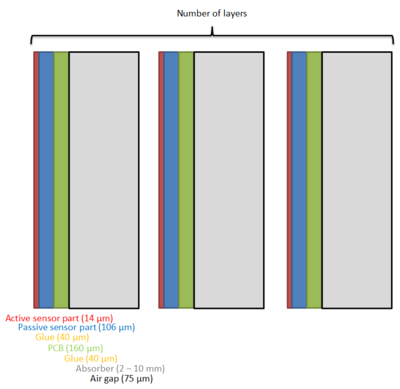DTC optimization: Difference between revisions
| Line 16: | Line 16: | ||
{| class="wikitable" | {| class="wikitable" | ||
|- | |- | ||
! Material !! Thickness !! Resolution !! | ! Material !! Thickness !! Resolution !! Excess straggling !! Add'l resolution !! Layers for 230 MeV + <math>5\sigma</math> | ||
|- | |- | ||
| Al|| 2 mm || 4.16 mm || 6.1% || 1.38 mm || 67 | | Al|| 2 mm || 4.16 mm || 6.1% || 1.38 mm || 67 | ||
Revision as of 11:01, 22 March 2017
Geometry and segmentation optimization of the Digital Tracking Calorimeter
Optimization philosophy
Geometry
Materials
Software
The software for this project is Gate installation and the DTC toolkit. For a complete guide to use the software for optimization, see the page Software for design optimization.
Results
All following values are given in units of Water Equivalent Thickness! How many layers are needed?
| Material | Thickness | Resolution | Excess straggling | Add'l resolution | Layers for 230 MeV + [math]\displaystyle{ 5\sigma }[/math] |
|---|---|---|---|---|---|
| Al | 2 mm | 4.16 mm | 6.1% | 1.38 mm | 67 |
| Al | 3 mm | 4.26 mm | 9.2% | 1.69 mm | 48 |
| Al | 4 mm | ||||
| Al | 5 mm | ||||
| Al | 6 mm | ||||
| Al | 7 mm |



